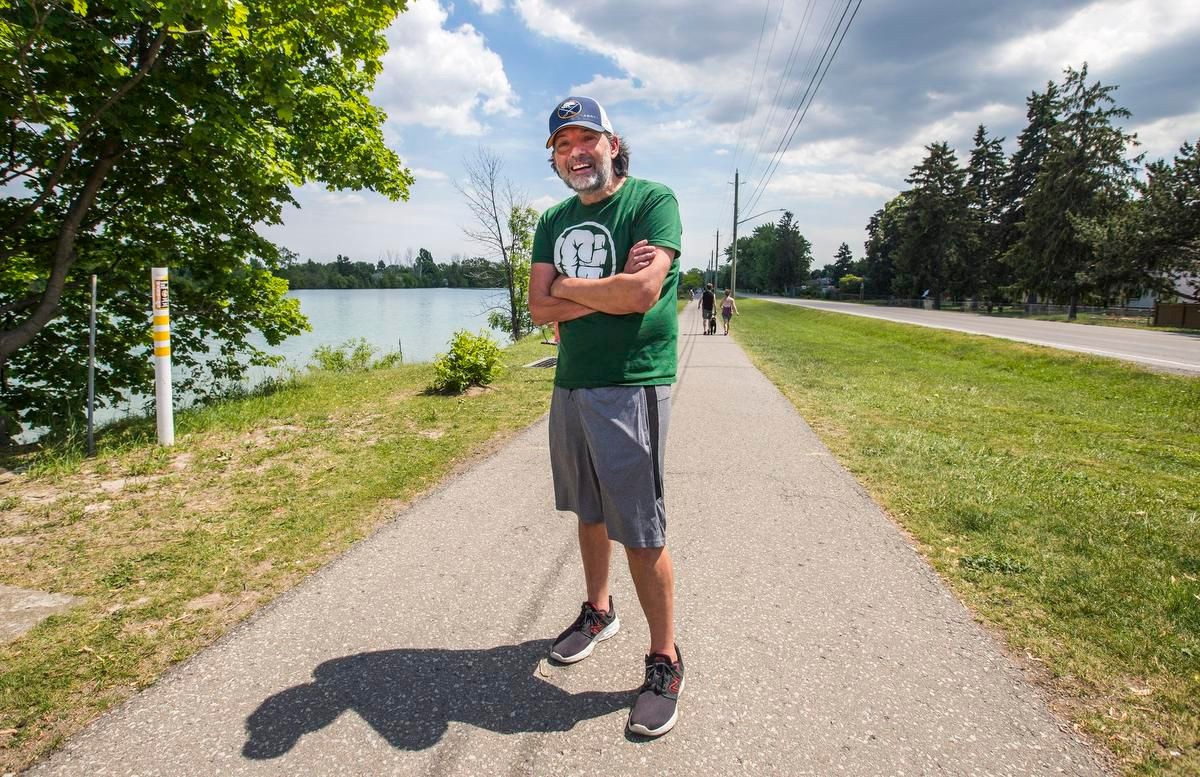
Steve Gallagher, of St. Catharines, was diagnosed nearly two years ago with ALS. He hopes people will support the June 20 Walk to End ALS. LIFE Fighting Lou Gehrig’s disease: Steve Gallagher is in it for life
Published in St. Catharines Standard June 2, 2021, written by Gord Howard
It’s the incurable disease best known for the baseball legend whose life it took. Steve Gallagher remembers the moment the doctor told him that’s what he had.
“I’d say it wasn’t a curveball thrown my way, it was like getting drilled with a 100 m.p.h. fastball to the head” to hear it was ALS, or Lou Gehrig’s disease, said Gallagher.
“It was like going from zero to 100 — I always had been in good health, always had been super active, and I appreciated that.”
That was nearly two years ago, in August 2019. He’s 48 now years old.
Gallagher knows the score: Amyotrophic lateral sclerosis slowly, progressively paralyzes people by cutting off communication from the brain to their muscles.
It picks off one muscle at a time, until eventually they can’t breathe. Eighty per cent of people diagnosed with it die within two to five years.
About 10 per cent live longer. Gehrig himself survived for about three years after being diagnosed, dying at 37.
Eighty years after he gave his famous farewell speech at Yankee Stadium, immortalized in the movie “Pride of the Yankees,” there are still only two ALS therapies approved for use in Canada. And no cure.
“There are promising things happening,” said Gallagher, of St. Catharines, citing research being done worldwide.
“I want to lend my voice to that effort, and as a living person with ALS, maybe it isn’t me who benefits but maybe 10 or 15 years down the road when people talk about ALS, they talk about people living with it and living with it well and for a long time.”
The annual Walk to End ALS fundraiser is set for June 20, and for the second year it will be a virtual event due to COVID-19.
Organizers want people to find a way to walk safely to raise money, then tune in that day from 10 a.m. until noon to watch activities online.
This year’s goal is $85,000, but so far the local group is only about 35 per cent of the way there. To register or donate, go to walktoendALS.ca/Ontario.
ALS Society of Canada regional manager Melissa van Tuyl called it a terrible disease that puts the person and their family through agony as it progresses.
There are some high-profile diseases, but ALS is not one of them.
“It’s known as Lou Gehrig’s and you’ll meet some people that know about it, but people don’t really know the harsh reality of ALS,” she said.
“With ALS, you lose your ability to walk, talk, swallow on your own. You choke on your own saliva, you can’t breathe.
“It’s a progressive, horrific illness that is vicious on people, and people don’t really know that.”
ALS used to strike mostly people 65 and older. It was known as the retirement disease. Now, due to more understanding and quicker diagnoses, she said some people are seen with it in their mid-30s.
“Young people present a whole new level of issues,” she said.
“We have young, working families, we have people having to take leave and being not financially stable with your kids at home. Just a whole new level of issues, when you have a terminal illness brought in that needs a huge level of care.”
The ALS Society gets no government assistance, relying entirely on fundraising. Therapies and equipment are extremely expensive, and the society helps provide things such as electric wheelchairs, walkers and special beds.
It also helps people with ALS navigate the confusing spiderweb of government programs, because time is not on their side.
Twenty-two months after being diagnosed, Gallagher — a former journalist at the St. Catharines Standard and Niagara Falls Review — now sometimes requires a breathing apparatus when he sleeps.
His first symptom two years ago was a loss of strength and co-ordination in one arm; now he is starting to notice it in his other arm. His voice isn’t quite as clear as it used to be, and he walks more carefully.
He gets a lot of support from family and friends. People want to ask him about his illness, but it’s hard. No one wants to say the wrong thing.
At the start, he said, it was difficult for him to talk about, too.
“At the beginning, absolutely. I didn’t want to. I knew I had a health-care team and a family that would support me,” he said.
“But now, no, it’s not hard. I have come to peace with my own mortality. I’ve accepted that, but it doesn’t mean I’m dwelling on it.
“I just know that my time may be limited, so if anything it’s an honour to talk about it. Because by talking about it … it raises awareness.”
At some point, he said, he stopped focusing on three letters and everything they stood for — ALS — and concentrated on four: H-O-P-E.
He is inspired when he learns about the ones who are beating the odds. He met someone living in eastern Ontario diagnosed in the 1990s who is still going “pretty strong.”
“Those stories of hope — I want those people to keep going,” he said. “I want to beat the record, but I want them to live forever, and live well.”
Join our fight to #EndALS!
Sign up as to receive periodic email updates and join our circle of supporters!